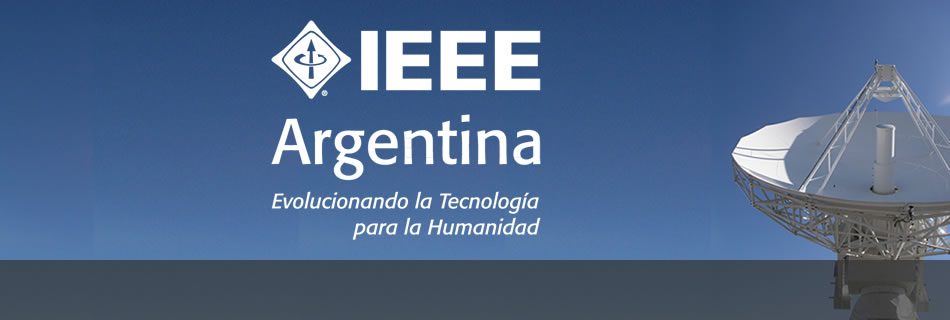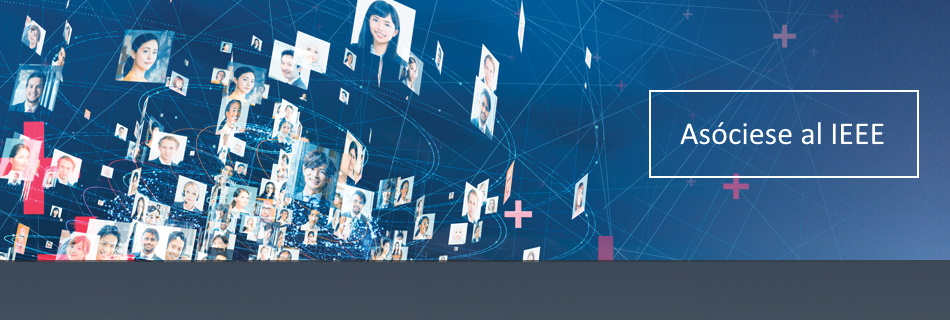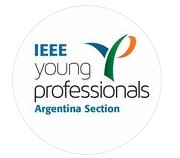Noticias y Actividades
Publicado el 26/07/2004
 RESUMEN DE PROXIMAS ACTIVIDADES
RESUMEN DE PROXIMAS ACTIVIDADES
IEEE y otros (Datos al 23-Jul-2004)
Salvo indicación en contrario, las actividades organizadas por IEEE se realizarán en la Sede de IEEE/CICOMRA, Av. Córdoba 744, Piso 1B, Buenos Aires.
* Lunes 26 al Sábado 31de Julio
ECI 2004 * ESCUELA DE CIENCIAS INFORMATICAS UBA* (18a. edición)
Mas información: http://www.dc.uba.ar/eci
* Viernes 6 de Agosto
IEEE Computational Intelligence Society - Capítulo Argentino
TAR-I - Jornada de Cierre. Exposición de Trabajos y entrega de premios.
* Jueves 19 de Agosto - Inicio de clases
* Viernes 30 de Julio - Cierre de Inscripción
Maestría y Carrera de Especialización en Data Mining & Knowledge Discovery
UBA - Facultades de Ciencias Exactas y Naturales y de Ingeniería
Mas información: http://www.dc.uba.ar/maestrias/data_mining
Consultas telefónicas: Depto. Computación (011) 4576-3359
Consultas por e-mail: data_mining@dc.uba.ar
* Lunes 23 y Jueves 26 de Agosto
IEEE Signal Processing Society - Capítulo Argentino
Curso SP1: 'Introducción a MATLAB, una herramienta matemática para profesionales'
Prof. Francisco Villaverde e Ing. Roxana Saint-Nom
* Martes 24 de Agosto
* Jornada de Potencia y Comunicaciones (en preparación)
Programa de Conferencistas Distinguidos
i) IEEE Power Engineering Society - Capítulo Argentino
Dr. Scott Rouse
Conferencia y Panel sobre Eficiencia Energética
ii) IEEE Communications Society - Capítulo Argentino
Conferencias sobre Comunicaciones Inalámbricas
- From Marconi to Wireless Internet: A Tutorial
* Lunes 30 de Agosto, 6 y 13 de Setiembre
IEEE Computer Society - Capítulo Argentino
Curso 'Business Intelligence'
Lic. Diego Keller
Lunes 30-Ago-04: Los 5 Estilos de Business Intelligence
Lunes 06-Sep-04: El Ciclo de Vida del Data Warehousing
Lunes 13-Sep-04: Las Mejores Prácticas de Data Warehousing
* Lunes 30 de Agosto al Viernes 3 de Setiembre
AADECA - Semana del Control Automatico
Mas información: http://www.aadeca.org/2004/
* Miércoles 1 al Viernes 3 de Setiembre
IV CAEDI Congreso Argentino de Enseñanza de Ingeniería
Organizado por el CONFEDI, Consejo Federal de Decanos de Ingeniería, el IV CAEDI, se llevará a cabo los días 1,2 y 3 de Septiembre en Buenos Aires en el ITBA, Instituto Tecnológico de Buenos Aires. Contará con la presencia de destacadas figuras internacionales que hablarán sobre nuevas metodologías de enseñanza y cambios curriculares.
Mas información:
Teléfono: (011) 4314-7778 int: 234 y 223
Fax: (011) 4314-0270
http://www.itba.edu.ar/IVCAEDI
e-mail: caedi@itba.edu.ar
* Martes 7, Jueves 9, Martes 14 y Jueves 16 de Setiembre
IEEE Signal Processing Society - Capítulo Argentino
Curso SP2: 'Introducción al Procesamiento Digital de Señales'
Ing. Daniel Jacoby e Ing. Roxana Saint-Nom
* Martes 21, Miércoles 22 y Jueves 23 de Setiembre
IEEE Computer Society - Capítulo Argentino
Programa de Conferencistas Distinguidos
Dr. Jaideep Srivastava
Conferencias sobre Web Intelligence & Data Mining
Mas información:
http://www.cs.umn.edu/faculty/srivasta.html
http://www.computer.org/chapter/DVP/Srivastrava.htm
* Lunes 20 al Viernes 24 de Setiembre
SADIO - 33 JAIIO - 33as. Jornadas Argentinas de Informática e Investigación Operativa
Se realizarán en el FAMAF - Universidad Nacional de Córdoba
Más información:
http://www.cs.famaf.unc.edu.ar/33JAIIO
* Martes 21 al Viernes 24 de Setiembre
EXPO COMM / IT ARGENTINA 2004 (12a. edición)
Organizado por CICOMRA, EJK, REED en La Rural , Buenos Aires
Más información:
* Martes 5, Jueves 7, Martes 12 y Jueves 14 de Octubre
IEEE Signal Processing Society - Capítulo Argentino
Curso SP3: 'Aplicaciones con Procesadores Digitales de Señales'
Ing. Daniel Jacoby e Ing. Roxana Saint-Nom
* Martes 2 de Noviembre (Buenos Aires)
* Jueves 4 de Noviembre (Córdoba)
IEEE Signal Processing Society - Capítulo Argentino
Programa de Conferencistas Distinguidos
Dr. Paulo S. R. Diniz y otros expositores
Conferencias del Dr. Diniz:
1) Adaptive systems for wireless communications
2) Filter-Bank Based Multicarrier Techniques
Más información:
http://www.ieee.org/organizations/society/sp/dltop2004.html
http://www.lps.ufrj.br/profs/diniz/
* Miércoles 17 al Viernes 19 de Noviembre
IEEE Control and Systems Society - Capítulo Argentino
Programa de Conferencistas Distinguidos
CAS Tour 2004 - En preparación.
Para mantenerse informado sobre novedades de IEEE Argentina recuerde visitar periodicamente la seccion 'Noticias y Actividades' en nuestra pagina web
BIOGRAPHICAL SKETCH OF VIJAY K. BHARGAVA
Vijay K. Bhargava received the B.Sc., M.Sc., and Ph.D. degrees from Queen's University, Kingston , ON , Canada in 1970, 1972 and 1974 respectively.
Currently, he is a Professor and Head of the Department of Electrical and Computer Engineering at the University of British Columbia , Vancouver , Canada . Previously he was with the University of Victoria (1984–2003) and with Concordia University in Montréal (1976–1984). He is a co-author of the book Digital Communications by Satellite (New York: Wiley, 1981), co-editor of Reed-Solomon Codes and Their Applications (New York: IEEE, 1994) and co-editor of Communications, Information and Network Security (Boston: Kluwer, 2002). His research interests are in wireless communications.
Dr. Bhargava is a Fellow of the B.C. Advanced Systems Institute, Engineering Institute of Canada (EIC), the IEEE, the Canadian Academy of Engineering and the Royal Society of Canada. He is a recipient of the IEEE Centennial Medal (1984), IEEE Canada's McNaughton Gold Medal (1995), the IEEE Haraden Pratt Award (1999), the IEEE Third Millennium Medal (2000), IEEE Graduate Teaching Award (2002), and the Eadie Medal of the Royal Society of Canada (2004).
Dr. Bhargava is very active in the IEEE and was nominated by the IEEE Board of Director for the Office of IEEE President-Elect. Currently he serves on the Board of Communications Society. He is an Editor for the IEEE Transactions on Wireless Communications. He is a Past President of the IEEE Information theory Society.
CONFERENCIA: From Marconi to Wireless Internet: A Tutorial
Abstract
On 12 December 2001, the speaker participated in the one hundred year anniversary celebration of Marconi's first transatlantic wireless experiment at a receiving site on Signal Hill, near St. John's Newfoundland , Canada . Since then, wireless communications has come a long way and it is safe to say that in the last two decades, the real progress has been due to the application of information theoretic concepts. With wireless Internet access using IMT 2000/WLAN around the corner, Information Theory's role has never been more important. We describe several techniques such as: Space-time codes, turbo, convolutional and Reed Solomon codes, multiuser detection, source coding and encryption which have served as enabling techniques for sophisticated wireless systems. Networking concepts such as wireless QoS resource control, Radio Access Networks (RAN), Advanced Medium Access Control (MAC) etc. which are necessary for Wireless Internet will be presented. The presentation will be suitable, not only for information theory researchers, but also for a general audience.
CONFERENCIA: 4G Wireless Communications
Abstract
With the myriad of communication services, user devices, and network technologies available, it is no wonder more attention is placed on realizing a fully-integrated networking solution: fourth generation (4G) wireless. The technology behind 4G wireless intends to resolve the anytime/anywhere problem associated with ubiquitous Internet access by choosing the appropriate access network according to user-location, application, and cost. It would then be possible for users to remain connected to the internet while roaming, as they move from expensive satellite- or cellular-based networks that offer low data rate over a wide area, to inexpensive WLAN-based and UWB-based networks that provide significantly higher data-rates over a shorter range.
The demand and expectation of higher data rate services with a mixture of applications creates technological challenges to the 4G networks to come. Research and development of 4G technologies is underway to meet these challenges with emphasis on: using the radio spectrum efficiently at the radio interface to achieve high data rates, provisioning effectively to meet the varying quality of service requirements of different applications, and networking properly to ensure ubiquitous access to the internet with mobility management. Paramount to the successful deployment of 4G is matching the system to the needs of the user.
Destacados











